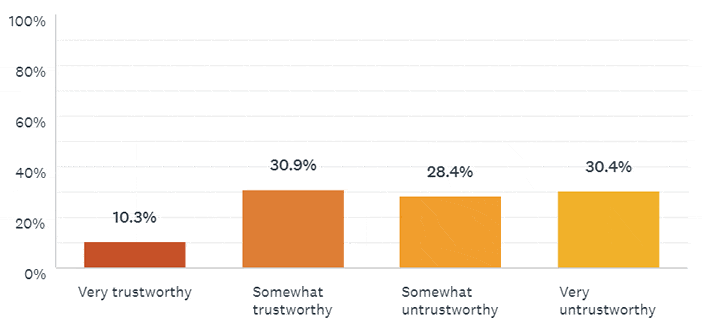The April LANDTHINK Pulse revealed that 30.9% of respondents believe that buy/sell groups on social media sites are SOMEWHAT TRUSTWORTHY for buying and selling real estate. It was basically a tie- just a fraction of a percentage difference- with 30.4%, who indicated they believed the groups to be VERY UNTRUSTWORTHY for discovering real estate for sale. Facebook is the place where nearly everyone goes to connect with their peers, and in the last couple of years, buy/sell groups have been springing up organically on the social networking site, uniting buyers and sellers of everything from cars to real estate. According to Facebook, over 450 million users visit these groups each month, but the groups were limited to friends and group members. In 2016, Facebook launched Marketplace, a tab within the app that allows all users to buy and sell across many different categories, including real estate.
Marketplace is Facebook’s answer to Craigslist, and competes with Realtor.com, Redfin, and Zillow, among others. The real estate section of Marketplace is quickly becoming a popular place to buy and sell a home, vacant land, or just find a place to rent, and Facebook’s powerful search algorithm lets potential buyers narrow their search based on location, price, or size. People can discover property for sale, but keep in mind that no real estate transactions actually take place on Marketplace.
The April Pulse posed the following question to our LANDTHINK audience: How trustworthy are buy/sell groups on social media sites for buying and selling real estate?
Facebook Marketplace has created an opportunity for both private sellers, brokers, agents, and property managers to market to an already captive audience. Listings posted on marketplace can be shared simultaneously on a personal or business page as well as buy/sell groups on the social media site.
If a buyer encounters a problem or finds themselves a victim of fraudulent real estate activity that originated in a buy/sell group, it’s usually because they purchased from a private (unlicensed) seller without the help of a buyer’s agent. Online buy/sell groups become much more trustworthy for discovering property for sale when buyers have their own agent looking out for their best interests.
Whether it’s a home or land for sale, purchasing real estate is a complex transaction- it might quite possibly be the most significant transaction a person will make in a lifetime. It’s likely never going to be the responsibility of any social media platform to actively police activity in online buy/sell groups, so all buyers need to be responsible for their own due diligence and actions, so as not to fall into the trap of a potentially fraudulent ad they stumble upon on social media.
Buyers need to know that licensed real estate agents (more specifically their responsible broker), are held to higher standards than the average private seller. Real estate agents who are members of the National Associations of REALTORS® (NAR), have chosen to abide by a strict Code of Ethics. While all real estate licensees must follow licensing laws, only REALTORS® are subject to NAR’s Code of Ethics.
There are pros and cons of selling property without a real estate agent, and the same holds true when buying property. Most property owners who are selling without a real estate agent typically do so to save a little money on a commission. Most buyers don’t realize it, but under most circumstances they do not have to pay a real estate agent for representation, so it’s a no-brainer not to seek out their services. The listings that are posted by real estate agents in online buy/sell groups, are done so by the sellers’ agent, and any potential buyer inquiring about the listing would be dealing directly with someone whose obligation is to the seller. A real estate agent’s commission is almost always paid for by the seller, so if you come across a For Sale By Owner (FSBO) listing you like in a buy/sell group, a commission can usually be negotiated between your agent and the seller.
In most states, if a real estate broker or agent knows of any major defects or hazards pertaining to property, they must disclose it to a potential buyer, even if the seller is not required to do so. Real estate agents cannot turn a blind eye to any potential issues they become aware of that might make a buyer think twice before purchasing. There are many types of “fraudulent” advertising, all defined differently by each state’s real estate commission. All real estate licensee’s must comply by the rules of the commission in the state in which they are licensed, and the responsibility of compliance always falls on the broker in charge.
Buyers should always conduct thorough background research and check the state license status of a real estate agent before purchasing property you come across in an online buy/sell group. The agents’ status, and any disciplinary action against them, can be found on the website for your state’s real estate commission. If a buyer forgoes representation, it is highly advisable that they have an attorney represent them.
The LANDTHINK audience was divided on the issue of the trustworthiness of buy/sell groups on social media, but the largest percentage (30.9%) deemed the groups SOMEWHAT TRUSTWORTHY for buying and selling real estate, 30.4% believed the groups to be VERY UNTRUSTWORTHY. This was followed closely by 28.4% who said they were SOMEWHAT UNTRUSTWORTHY. Only 10.3% of our audience believed buy/sell groups were a VERY TRUSTWORTHY place for buyers and sellers of real estate to connect.
Here are the final results:

We were pleased with the large number of Pulse responses, and we thank everyone who answered the Pulse and shared it on social media with friends and connections in the land industry. LANDTHINK would like to extend a big thank thank you to Satellite Prolink for sponsoring the April Pulse and for coming up with a very interesting question to pose to our audience. Since 1995, Satellite Prolink’s experienced team has been designing, implementing and monitoring custom advertising plans for auctioneers nationwide. As a full service advertising agency, they handle the plan from beginning to end including market research, project management, graphic design, quality assurance and complete accounting.
Become a Pulse sponsor! It’s a great way to ensure your brokerage is the first one buyers and sellers call when they have a need to buy or sell property. You’ll get insane exposure on Social + Email + Web. That’s 500,000+ monthly eyes on you! Once you have it, you won’t want to give it up! Pulse sponsorships are offered on a first come first serve basis and are subject to certain limitations. If your business would be interested in sponsoring the June Pulse question, please contact us soon.
Do you have a suggestion for next month’s Pulse question? Submit your question and we might choose yours!
We want to know what you think about our May Pulse question, chosen and sponsored by LandMart.com: Should property taxes paid on land include funding for local schools if the land owner lives out-of-state? Answer now.
This content may not be used or reproduced in any manner whatsoever, in part or in whole, without written permission of LANDTHINK. Use of this content without permission is a violation of federal copyright law. The articles, posts, comments, opinions and information provided by LANDTHINK are for informational and research purposes only and DOES NOT substitute or coincide with the advice of an attorney, accountant, real estate broker or any other licensed real estate professional. LANDTHINK strongly advises visitors and readers to seek their own professional guidance and advice related to buying, investing in or selling real estate.









Add Comment